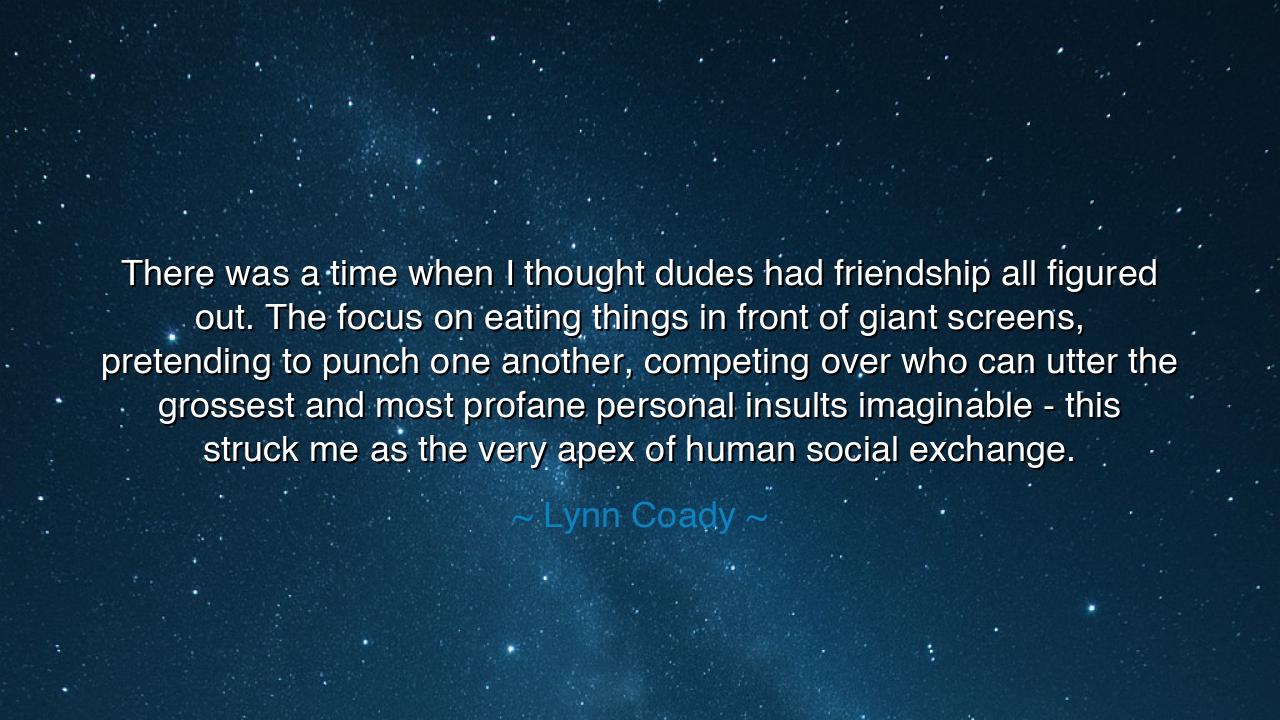
There was a time when I thought dudes had friendship all figured
There was a time when I thought dudes had friendship all figured out. The focus on eating things in front of giant screens, pretending to punch one another, competing over who can utter the grossest and most profane personal insults imaginable - this struck me as the very apex of human social exchange.






In the early days of human existence, when tribes gathered around the fires under the watchful eyes of the stars, friendship was forged in the fires of necessity and survival. It was a bond built on loyalty, trust, and the shared struggles of the world. Yet in our age, we are faced with a new version of friendship, one that Lynn Coady reflects upon with both humor and insight: "There was a time when I thought dudes had friendship all figured out. The focus on eating things in front of giant screens, pretending to punch one another, competing over who can utter the grossest and most **profane personal insults imaginable - this struck me as the very apex of human social exchange." In these words, we are called to examine the superficial nature of certain modern friendships—bonds that are built not on depth but on performance, on the need to impress rather than to connect.
In the ancient times, the true test of a man’s friendship was not in his ability to entertain or to belittle his companion but in the willingness to stand shoulder to shoulder in the face of danger, to share in moments of sorrow and joy, and to nurture one another's souls. Take, for example, the bond between David and Jonathan in the Bible—two souls so deeply intertwined that their friendship transcended even the bonds of blood. It was a friendship built not on competition or shallow jests, but on mutual respect, love, and an understanding that ran deeper than words. This was the true nature of friendship—a bond that withstood trials, lifted spirits, and weathered the storms of life.
Yet Coady’s observation presents a stark contrast. She speaks of a modern friendship that is marked by competition, insults, and the need for external validation. The image she conjures is of men gathered together, engaging in what might appear to be playful antics—yet beneath the surface, there is something missing. The act of pretending to punch one another, the constant competition over who can utter the most offensive or distasteful words, may seem like a ritual of bonding, but in truth, it is an empty performance—a deflection of true connection. This is not the sacred bond of friendship, but a show for the audience, a performance designed to satisfy the ego rather than nurture the soul.
Consider the ancient warriors, who did not gather to belittle each other or to mock their companions. Instead, they came together with a shared purpose—whether it was to fight for honor, to celebrate victories, or to mourn the loss of comrades. The greatest friendships of the past were forged in the heat of battle or in the quiet moments after, when the laughter and tears were real, and not for show. The Greeks, for instance, told stories of Achilles and Patroclus, whose friendship was not marked by insults or bravado, but by a mutual understanding of the burdens of war, a bond so strong that it transcended even the grave. Their friendship was pure in its devotion, deep in its intimacy, and heroic in its sacrifice. This was the true measure of friendship—a bond tested and proven through actions rather than words alone.
Coady’s words, however, ask us to question the nature of modern friendships, particularly those that are built on performative actions rather than authentic connection. The idea that friendship can be reduced to competitive jests, to trying to outdo one another with insults and ridicule, is a reflection of the times we live in—a time when social media, public performance, and instant gratification dominate the ways we connect with one another. This kind of friendship may seem to satisfy in the moment, but it lacks the nourishment that comes from genuine understanding, from the kind of deep connection that is forged over time and through shared experience.
The lesson to be taken from Coady’s reflection is this: in the pursuit of true friendship, we must seek not the performance of connection but its substance. We must ask ourselves: What is the foundation of the relationships we cultivate? Are they built on mutual respect, vulnerability, and honesty, or are they based on the need to impress, to win, or to outdo one another? The friendships that will endure are those that are grounded in authenticity, that are nurtured through shared experiences rather than shallow antics.
In our own lives, let us strive to create friendships that are not defined by the superficial, but by the deep and meaningful exchanges of the heart. Let us seek the true bonds—those that can weather the storms, those that do not need competition to thrive. Whether in moments of laughter or sorrow, let us embrace the kind of friendship that enriches our souls and does not leave us empty. And let us remember the ancient wisdom: true connection is not found in the show of the moment, but in the depth of the bond shared between souls.






AAdministratorAdministrator
Welcome, honored guests. Please leave a comment, we will respond soon